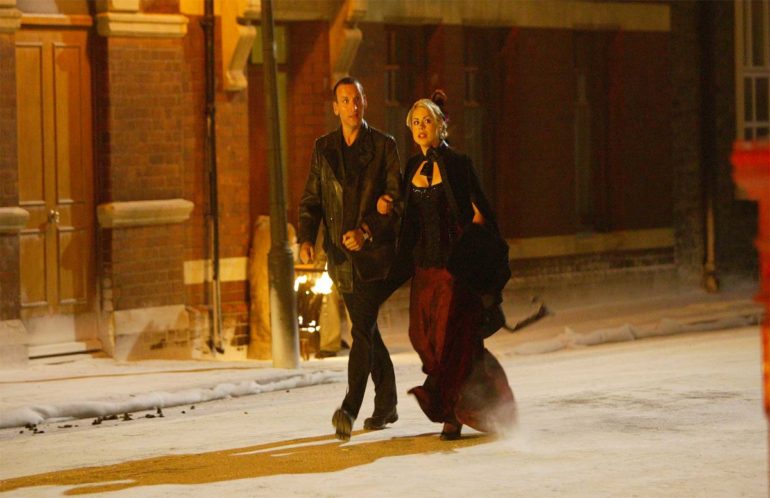But, it’s like, think about it, though. Christmas. 1860. Happens once, just once and it’s gone, it’s finished, it’ll never happen again. Except for you. You can go back and see days that are dead and gone a hundred thousand sunsets ago. No wonder you never stay still.
The Unquiet Dead, episode three, was our very first historical episode of the reboot, and I think it is still one of the best. With mysterious ghosts roaming the streets of Cardiff and Charles Dickens the star of the episode, there is a lot here to love.
The thing that strikes me about going back to these early episodes is how simple they are. And I don’t in any way mean that as a bad thing. It is no secret that a bit deeper into the show, in the Matt Smith era and beyond, things could get really, really complicated. So complicated that I’m amazed any kids could keep up with it, because I sure as heck couldn’t. So the simplicity of these early stories is really fun to revisit. The Unquiet Dead really only has two settings – the theatre and the funeral parlour – and three actors, apart from Eccleston and Piper. It really helps to focus in on the story and what the episode is trying to tell us.
One of those actors, of course, is Simon Callow as Charles Dickens. He was the first big guest star to appear in the flesh (Zoe Wanamaker voiced Cassandra in The End of the World but didn’t appear). To get someone with Callow’s credentials that early in the run was testament to how confident everyone was in how Doctor Who would be received – he wasn’t a BBC regular guest star for sure. Of course, he is completely delightful as a Dickens who is a little bit down, alone at Christmas, in a strange city. As he becomes caught up in the ghost story happening around him, he comes alive. He even has a Scrooge moment at the end when he practically skips away from the TARDIS, rejuvenated.
Actually, I realised that although the season five episode Vincent and the Doctor is the one everyone remembers for that heartwarming ending where Vincent Van Gogh gets to see how popular his work becomes, this episode actually does it first. The Doctor changes Dickens’ whole demeanour by telling him that people read his books forever. We even get the same sad note to the ending when the Doctor tells Rose it won’t change anything because Dickens will die the following year, just as the Doctor tells Amy that Van Gogh will still meet his sad end, even knowing what the future holds. It’s just interesting to note the themes, and to see that series one had those same emotional moments, only often more restrained, than what came later.
As with The End of the World, the other main purpose of this episode was to set things up and continue to build the Doctor’s character. This is the first time we hear about the rift that runs under Cardiff, which will have implications going forwards and also be the entire reason that Torchwood ends up in Cardiff too. We hear about Rose’s dad when Gwyneth tells her that she has been thinking about him, and he will come up. (It’s also fun to look back and Eva Myles as Gwyneth. She was the first actor to make an appearance and then come back in a more prominent role, when she played Gwen in Torchwood. Freema Agyeman, Peter Capaldi and Karen Gillen would be a few more that took the same route.)
We also get more references to the Time War as the Gelth (the beings trying to inhabit the dead of Cardiff) tell the Doctor that the war was devastating for them as a species. ‘The whole universe convulsed’ is such a provocative phrase. The Doctor, despite Rose’s protests, is prepared to let Gwyneth serve as a vessel to let the Gelth come through the rift and use the bodies in the funeral parlour to inhabit.
It isn’t his fault that the Gelth are up to no good – he couldn’t have known – but we know him well enough by this episode to understand that the mention of the Time War would have been enough to tip him over the edge. He had to help them, because the guilt he’s carrying wouldn’t have let him do anything else. There are a lot of moments like this one, if I am remembering correctly, where Rose serves as the real voice of reason. She tempers Nine and he really needs that from her. She doesn’t always understand what is happening, but she is very quickly coming to understand him.
Some of the coverage you find on Cultured Vultures contains affiliate links, which provide us with small commissions based on purchases made from visiting our site. We cover gaming news, movie reviews, wrestling and much more.



